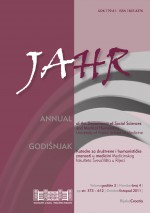Bioethical common factors amidst Krause masonry and Saint Francis of Assisi systems of thought appeal to respectful dialogue, nature and understanding: the Jahr’s dialogue beyond the age of "enlightment" and the metadisciplinary "dark" ages
Keywords:
: Fritz Jahr, Prime Bioethics, Metadiscipline, Saint Francis of Assisi, Bioethical Dialogue, Enlightenment, Dark Ages, Beliefs, Dual NatureAbstract
It has been known that the fi rst reference of the word Bioethics in the twentieth century was due
to German theologist Fritz Jahr in 1927. In that surprising paper Jahr, a protestant Lutheran
university professor, proposes humble catholic deacon, Saint Francis of Assisi (1181-1226), as
the fi rst discoverer of Bioethics in Western Civilization. At the same time, Jahr quotes K.C.F
Krause, a Masonic mathematics and philosophy doctor, who is referred within this manuscript
because of his ideas on Life respect regarding also any given species. Saint Francis, a medieval
icon who prevails as the devoted saint of ecologists and peacemakers, was the rebuilder of the
catholic faith during those chaotic and excessively philosophical / theological times, when Life
got under human siege. Krause was expelled from the Masonic movement (1810) while Saint
Francis was advised to become an isolated hermit (1209) to be kept aside from the community
due to his, somehow, rebellious strict observance of the original gospel in times when richness
and vanity were becoming a sign of social success. Th ey represent diff erent methods regarding
the same concern: Th at is to say, Life protection and peaceful stability. While the saint appeals
to Love, the academic one trusts the Law as basic strategy. Historical and Philosophical contexts
and controversies are also analyzed. Beliefs, knowledge, bias, prejudices, intellectual fi ghts defi ne
the way many people live and assume their own and others’ lives.
Downloads
Published
Issue
Section
License
Authors who publish with this journal agree to the following terms:
- Authors retain copyright and grant the journal right of first publication with the work simultaneously licensed under a Creative Commons Attribution License that allows others to share the work with an acknowledgement of the work's authorship and initial publication in this journal.
- Authors are able to enter into separate, additional contractual arrangements for the non-exclusive distribution of the journal's published version of the work (e.g., post it to an institutional repository or publish it in a book), with an acknowledgement of its initial publication in this journal.
- Authors are permitted and encouraged to post their work online (e.g., in institutional repositories or on their website) prior to and during the submission process, as it can lead to productive exchanges, as well as earlier and greater citation of published work (See The Effect of Open Access).



